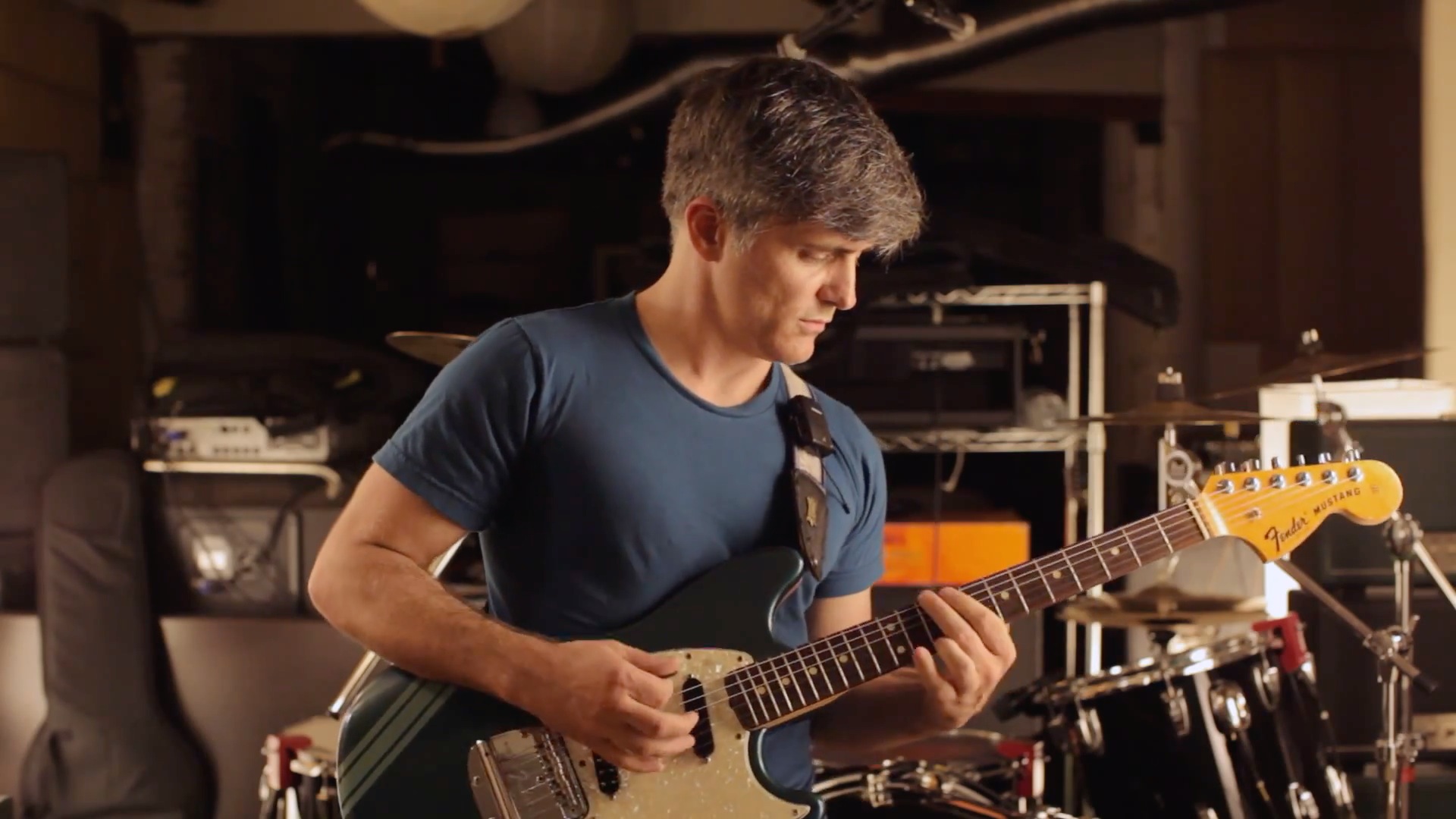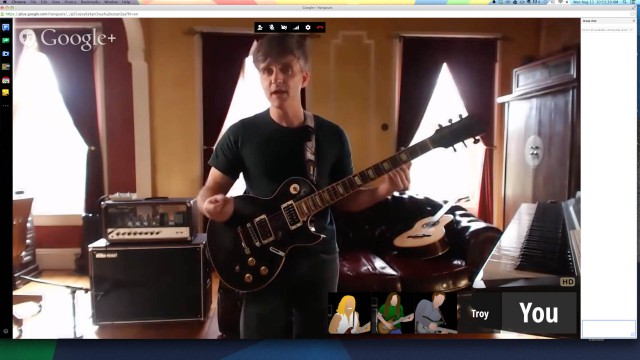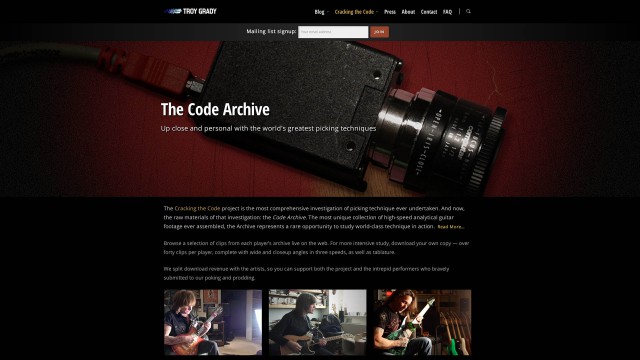
Today we’re launching an amazing new way to learn about picking technique. It’s called Masters in Mechanics, and it’s something we’re really excited to offer — in fact it builds on all the work we’ve been doing so far.
The Power — and Limitations — of Video
We’ve been working on Cracking the Code for years — figuring out the best way to package technical material into a fun, entertaining, and informative documentary series. We want the show, and everything else we make, to stand the test of time and be the definitive educational resource on picking technique available anywhere. That’s why we don’t make something if we don’t think it’s worth spending as much time as it takes to make it truly great.

MILLION MINUTES, BABY: We’re astounded — and humbled — by how much time you all have collectively spent watching the show.
And the reception to the show so far has been phenomenal. The premiere episode of Season 2, “Get Down for the Upstroke”, is closing in on 10,000 views. Our Vai lesson positively streaked past 100,000 and shows no signs of stopping. And just today we’ve noticed another amazing statistic: you’ve collectively watched over a million minutes of Cracking the Code. We’ve been accumulating thousands of subscribers and hundreds of comments attesting to how much the show resonates.
However, there are some things we can’t do with video alone. For one, due to the amount of work involved in production, we can’t get you information as quickly as we’d like — and we know the pain of waiting when you know the ideas are there but not yet in finished shape. Second, when we’re making a show watched by thousands, we can’t make the experience of watching them interactive and personalized. In the episodes, we pick our battles, illustrating a few fundamental concepts with all our visual firepower so that they can be communicated clearly even to casual observers. They’re designed not to exhaust the topic, but to introduce it. But sometimes, you may want to dig deeper and explore the material through the lens of your own experience and learning needs.
We’ll Do It Live!
Earlier this month, we hosted our first ever “Talking the Code” live discussion — hopefully the first of many. We riffed on the Season 2 premiere and the mechanics of Yngwie’s techniques, detailed the six fundamental components of picking, and answered tons of your questions. In all, it was a resounding success. Over 180 viewers tuned in live from 22 different countries, and over 2,000 have watched the recording since then, in just over a week.

TALKING THE CODE: And talk we did — over an hour and a half on air, and damned if many of you didn’t stick around and listen to the whole thing.
The live streaming format worked incredibly well. It enabled personal, two-way conversation, let us meet a ton of people we’d previously only interacted with via email, and showed us the enthusiasm and connection so many of you have with the material. We were surprised by great questions that led to unplanned discussion (and further questions, cascading like dominos!) and had a lot of fun with the discussion. While the inaugural “Talking the Code” event proved how awesome this interactive participation can be, the limited time and size of the group meant there was unfortunately no way we could get to all your questions, let alone dive deep into every cool technical guitar topic we might want to talk about.
We’ve been trying for a while to figure out a way how to offer something more interactive and personalized. And we wanted to do something different than a one-on-one Skype lesson — there are already lots of brilliant teachers offering that.
So we got to thinking: how might we translate our unique brand of swashbuckling analysis to a highly personalized experience, one that didn’t step away from the core mission of Cracking the Code but instead amped it up tenfold to its logical extreme, and turbocharged your learning?
What if you could watch the entirety of Season 2 not in eight months, but in eight weeks? What if you could do it, not with thousands of others on the Internet, but with just a handful of other talented students? And what if it didn’t cost more than a guitar lesson to do it?
In fact, we already have the syllabus for such an initiative — the script for the show itself — and we’ve been refining it for years. When we saw the sheer volume of questions during “Talking the Code” — and the continued interest post-broadcast that inundated us with inquiries via emails and comments — a solution to this clicked. With the script as our syllabus, and a private nook of the Internet as our classroom…
Mastering the Discussion
We’re excited to introduce the Cracking the Code Masters in Mechanics. It’s a series of small-group discussions designed to conduct a live investigation into all the technical concepts in Season 2 of Cracking the Code. It will be a small group of intrepid investigators going frame by frame through historical footage to deduce how the greatest picking techniques in history actually work.

COME HANG OUT: We’ll be digging deep, with just a few other players, to explore the mechanics of picking in an interactive Google Hangout seminar.
Masters in Mechanics is about effectively communicating the concepts that will help you improve your picking. This doesn’t require an endless cycle of incremental improvements, and we’ll deliver a great value in a concise format. Our mission is to take you through the material and leave you with a thorough understanding of how these techniques work, and we’ll make sure that happens in each and every seminar.
What’s the difference between this and the show? Each of these seminars corresponds roughly to an episode, but we’re structuring the material differently: we’ll focus less on presenting the basics (and entertainment value) and more on practical learning with personal attention and interactive feedback.
We love the interactive quality of this — it creates fertile ground for incredible educational insights, and leads to the collective generation of better instruction, through specific feedback, follow-up questions, and group discussion. With Talking the Code as evidence that this works, now we have a way to make it even better. And with a tiny class size like this, we’ll eliminate any concerns about your question not being heard.
Seminar Details
Masters in Mechanics is totally a la carte. Each seminar corresponds to one episode of Cracking the Code, but you can take whichever you’re most interested in, in any order you like, even if those episodes haven’t aired yet.
The experience will be like that of a high-level college course, but at a fraction of the price. At $50 per seminar, it’s no more than you’d pay for a guitar lesson — and we’re not going to micromanage the clock. We’ll spend as much time as it takes to get through the material and the Q&A, and give you the technical feedback you need to get started practicing.
All you’ll need is a webcam, Internet connection, and your guitar. Google Hangouts allows us to step through YouTube clips in perfect sync with the group, and this is the killer app that enables our investigation. In the course of our journey, you can ask questions at any point, and we’ll have plenty of time for individual feedback. We’ll be drawing on various sources, including Code Archive clips that don’t even appear in the show.

UNLOCKING THE ARCHIVES: Masters in Mechanics seminars will feature unprecedented analysis of Code techniques in action, starting with our own slow-motion footage.
Finally, we’ll include a bundle of special bonus downloads with each seminar, featuring things like tablature and exclusive slow-motion video filmed with our custom-designed camera mount. One of these will be our new “Volcano Pack” — the most comprehensive collection of Yngwie-style licks every assembled, and a versatile construction set of phrases you can connect together, Lego-like, in your own playing. In the pack, we’ll show you exactly how to do that, and the complete set is available only for Masters in Mechanics students.
To start, we’re offering just two sessions of the first Seminar, with four slots available for each. Sign up is first come, first served — but if there’s enough interest, we’ll open up more soon, so stay tuned!
As creativity and technology advance in lockstep, each generation builds on the work that comes before us. The fact that even the greatest picking legends aren’t aware of the precise mechanics that enable their physical genius may be surprising, but it isn’t their fault. The knowledge simply hasn’t existed.
Now, though, we’re poised to unlock a trove of technical insights into these underlying mechanics — insights that can dramatically improve your technique. Together, we’ll continue to learn, and build a better understanding of the instrument than anyone’s ever had before.
Check out the schedule, and sign up, right here.